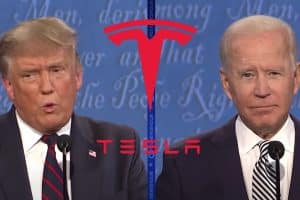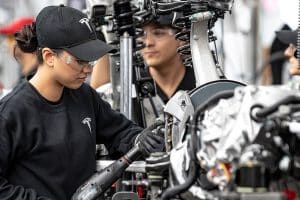Key Points
- 🏛️ A judge ruled in favor of Tesla in a lawsuit alleging a parts and services monopoly, dismissing the claims.
- ⚖️ The lawsuit, filed by a Model S owner, accused Tesla of monopolizing parts, causing delays, and forcing customers to pay high prices.
- 🚗 Tesla owners were claimed to face restrictions in repair options, unable to choose third-party or OEM parts outside of Tesla’s service centers.
- 📜 The judge, Trina Thompson, ruled that the class-action proposal lacked evidence that the alleged issues were not generally known or unpredictable at the time of purchase.
- 🔄 Customers have the option to amend their complaint, but currently, Tesla owners must use the automaker’s service centers and parts to maintain warranties.
- 💥 Recent data suggests Tesla’s crash repairs are generally more expensive than those of other vehicles, and non-Tesla EV repair prices are nearing parity with gas vehicles.
A judge has ruled in Tesla’s favor in a lawsuit claiming that the automaker has monopolized parts and services and forced customers to pay high prices, despite long waits.
The lawsuit was filed earlier this year in a federal court by Model S owner Virginia M. Lambrix, who alleged that Tesla did not offer the same broad set of repair options offered by most OEMs, resulting in “lengthy delays in repairing or maintaining their electric vehicles” and forcing owners to “pay supracompetitive prices for those parts and repairs once they are finally provided.”
On Friday night, San Francisco-based U.S. District Judge Trina Thompson ruled that the class-action proposal did not demonstrate either that the alleged issues were “not generally known” upon purchase or that costs to keep vehicles on the road were not predictable, according to Reuters.
The suit combined five separate lawsuits in which drivers paid for repairs and parts services from Tesla since March 2019. The original complaint noted that Tesla owners could not have their vehicles fixed at dealerships or independent auto shops, nor could they choose to use either third-party or OEM parts to repair the EVs.
Thompson argued that the customers could not prove that Tesla had coerced them into using their repairs and parts just by their purchasing the electric vehicles (EVs).
“To be sure, plaintiffs allege that defendant misled them about…how much maintenance its EVs are designed to need and how long that maintenance ought to take,” Thompson wrote in the ruling. “But nowhere do plaintiffs allege that consumers are in fact unaware of the supposedly supracompetitive prices and exorbitant wait times.”
Thompson also said customers could amend their complaint following the ruling. Lawyers for the Tesla owners did not respond to requests for comment on Saturday.
Tesla owners must either have their vehicles repaired at the automaker’s own service centers or at certified service centers. Additionally, owners must use Tesla’s parts rather than using those from third-party manufacturers, or they can void their warranties in many cases.
Data surfaced last month showing that Tesla’s crash repairs are generally more expensive than those of gasoline vehicles and other EVs, though perhaps not to the degree that some have claimed. Additionally, many non-Tesla EV repair prices appear to be nearing parity with gas vehicles as they’re more widely adopted.





